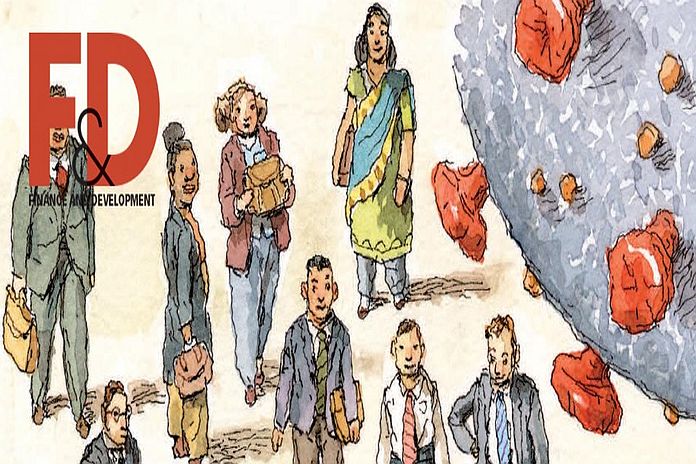By Gita Bhatt
Five months ago we set out to write in this issue of Finance & Development about political economy—how politics affects the economy and the economy affects politics. Few suspected then that, instead of exploring an academic question, we would be witnessing real-world political economy dynamics unfolding, tragically, in real-time. The pandemic, with its appalling loss of life, has brought the Great Lockdown and frozen the wheels of commerce. People’s lives have been turned upside down, punctuated by furloughs, facemasks, and fear.
While this health crisis reoriented our focus, the issue of political economy is more relevant than ever. It underscores the notion that policies are made not just on the basis of economic analysis but under the influences of non-economic social and political forces. And it compels us to think about how people and the economy will adjust in a post-pandemic world.
This issue features diverse articles related to political economy through the lens of COVID-19. Jeff Frieden, Andrés Velasco, and others examine the importance of institutions, identity, and trust. Antoinette Sayeh and Ralph Chami weigh policy solutions as this crisis robs millions of migrants of work opportunities, slashing remittances, the single most important flow of income for many poor countries. Ann Florini and Sunil Sharma argue that dealing with systemic fragilities requires that resilience—society’s ability to absorb and adapt to change—receive equal billing with efficiency. Other articles discuss the need for social cohesion and solidarity, with policies that protect and lift the most vulnerable as jobs disappear and inequities deepen.
Managing the effects of the pandemic prompts a real discussion of how best to implement the policy response to reach all segments of the population. To a large extent, economic policy will shape society’s resilience to the emergency and its aftermath.
But a crisis of this scale is a global turning point, forcing economists and others to expand their imagination and experiment with radical new ideas about how the world works. Such a reimagining, as Kristalina Georgieva notes in her essay, could lead us to a greener, digitally smarter, fairer, and more compassionate world. Perhaps this is a chance to reset the fundamentals of our social and economic life.
The interdisciplinary field of political economy owes its emergence to Alberto Alesina, a great scholar who passed away on May 23. IMF Chief Economist Gita Gopinath reflects on Alesina’s far-reaching influence.
Gita Bhatt is the Head of Policy Communications and editor-in-chief of F&D.





